Pip Newling reviews Dirty Words by Natalie Harkin
by Natalie Harkin
Cordite Books
ISBN 978-0-994259-63-9
Reviewed by PIP NEWLING
‘Consider this words
![]() like lives
like lives
have histories
![]() actions
actions
![]() like knives
like knives
![]() cut-deep’ (p.23)
cut-deep’ (p.23)
Natalie Harkin’s first collection of poetry, Dirty Words, illustrates the effects of words down the generations of white Australia’s history. Harkin is a Narungga writer from South Australia and this suite of poems, what Harkin calls ‘an A to Z index of poetry’, begins with ‘Apology’ and continues through ‘Genocide’, ‘Political Correctness’, ‘Xenophobia’ finally completing the cycle with ‘Zero Tolerance’. Describing the work as a short survey through Australia’s recent political and racial history though, while doing justice to the overarching structure of the collection, undermines the real power of Harkin’s work.
Writing into the space between popular assumptions and lived experience Harkin is interested in examining the real and the remembered against the commonly held conclusion. Overlaid with statements by politicians, comments on contemporary Australian society, and texts from the white documentation of this country, Harkin makes obvious the effect of words on lives and histories, both past and future.
Harkin describes how an Aunty would undertake the ‘much work to be done’ as her ‘sing-chant-rage’ and Peter Minter, in his introduction, picks up on this phrase, expanding the triptych to encompass the whole work. Dirty Words is a ‘sing-chant-rage’ but it is also a lament and a call to action.
In particular, the poems form a snapshot of the years from 1996 through to 2014, with former Prime Minister’s John Howard, Kevin Rudd and Tony Abbott, the Intervention, land rights and sovereignty, and the Stolen Generations, all appearing within the text. Many of the poems draw on archival texts as far ranging as government legislation, politicians speeches, royal commission recommendations, academic writing, news reports, magazines and personal letters to contextualise and expose racist attitudes towards Aboriginal people in this country, attitudes that are still present in government policy for, and community expectations of, Aboriginal people generally.
For instance, ‘D’ in Harkin’s dictionary is for ‘Domestic’ and begins with a quote from academic and writer Professor Jackie Huggins,
‘The stories of Aboriginal women domestic servants cannot be told enough. They illuminate a deeply-rooted racist facet of Australia’s history. They tell of the trials tribulations and triumphs amidst the backdrop of oppression.’ (p10)
What these histories do within the text is to reveal how interconnected we all are to colonialism in its history and its present within this country. The point of view that Harkin brings to these issues is personal but also national, revealing the links of complicity, trauma and loss. To highlight the complicity of white women (for whose domesticity were these women serving?) in the processes of colonisation, discrimination and oppression Harkin quotes directly from a 1926 publication, The Australian Woman’s Mirror, and shifts the phrasing and enjambments to force the reader to slow, to grasp the extent of the horror these young women endured:
I got her direct from a camp some miles from here and until she
became used to things I had to tolerate the company of her mother and
younger sister for a fortnight [she] was then about 12 years …’ (p7)
That line ‘I got her from a camp’, and the (white) space around it, catches me every time I read this work, reminding me of the everyday power that has been exerted by individuals throughout white Australia’s history. It is also a phrase that, for me as a white woman of this land, holds the mirror clear and still. Harkin’s work is without irony and can be brutal in her demand that the reader recognise herself on the page.
This focus on Aboriginal women’s experience of colonisation is one of the themes of the work, particularly under the inclusion for ‘R’, Resistance. Here Harkin invokes her Aunties lives as rhyme and rage and sophistication and vision, listing their character, work, accomplishments and her ongoing relationship to them:
These days I think of Aunty Irene … and her look grounds me’, (p25)
These days I think of Aunty Elaine … all tough-love-grit …
all elder-knowledge-strength’ (p26)
These days I think of Aunty Charlotte …
one of the wise-ones she survived
this country’s shame and lived on to tell it Like. It. Is’ (p27)
These days I think of Aunty Veronica… big-
hearted-warrior-woman …
she fought hard proud strong …
today’s picket-lines and rallies
are too gentle without her today’s healing-circles are broken
without her’ (p28)
These days I think of Aunty Doreen … her brilliant photographic-
memory begins … almost impossible to take in … she
puts me in my place family history
stories float gently…’ (p29)
These days I think of Aunty Vi …
we always end up talking about what connects us …
quietly writing documenting speaking for justice education
peace … this yearning for
more conversation is an un-settled mourning …’ (p30)
This section closes with Harkin’s action of remembering how useful it is to remember who and what has gone before:
These days
I think of the women
who fought and loved so hard
I raise my hand catch their last breath
with clenched-fist-resist
I thank them
The image Harkin creates here also draws the reader to that powerful image of the African American athletes on the winners podium at the 1968 Olympic Games, fists raised with pride and so they could not be ignored. Similarly, Harkin’s embedding of these women in her text, and these passages are the foundation of the work, means that their lives, their energy, their purpose can not be ignored or dissembled or dismissed.
There is much movement throughout all the poems: oceans storm, tall ships float, words are carried, we are instructed to walk, we are told of hugs, of protests, of talk, of going bush and of love in many guises. Harkin understands the way words can lift and sweep the reader along, and how to create shock and surprise on the page. As I read, from front to back, then dipping in and out, then back to front, perspectives changed, vistas loomed and retreated, some phrases glimmered as though they were mirages in the desert:
Old boats
elicit great excitement
heady feverish
national pride
old boats
re-enact silence
![]() as frontier-myths
as frontier-myths
![]() glide
glide
![]()
![]() into tomorrow (p34)
into tomorrow (p34)
The other foundation of the work is the land itself and Dirty Words is a significant pleading for environmental restraint and recuperation. ‘Apology’ might be expected to draw on the Stolen Generations and Kevin Rudd’s 2007 apology to those Aboriginal people taken from their families because of government policy. But Harkin neatly and profoundly uses this moment to place the issue of uranium mining up front, linking the mining of uranium in Australia, Aboriginal land rights, and cultural dispossession to the Fukushima and Chernobyl disasters:
‘with heart-resolve
Traditional Owners state
their Apology
Welcome Mr Naoto Kan
[ex-Prime Minister of Japan]
we are very sad
we are very sad
the ongoing disaster
in Japan
come witness the impact
of where it began
at the start
of this nuclear
cycle
This work can be opened at any page and the reader will be met with a layered, complex, re-telling of contemporary Australia. Harkin’s words carry weight and demand the reader recognise their relationship to the map of Australia that Harkin writes. Dirty Words is shimmering rage, weary heartbrokenness and careful optimism and it stands tall and unwavering, a landmark in Australian publishing.
PIP NEWLING’s first book was Knockabout Girl: A Memoir (HCA) and her creative nonfiction writing has been published in Meanjin, Kill Your Darlings and the Fish Anthology. She is currently writing about local swimming pools, and has a Doctor of Creative Arts (Creative Writing) from Wollongong University in which she wrote about place, race and community and wrote a memoir of her hometown, Taree in NSW.


 John Kinsella’s most recent books of poetry are Firebreaks (WW Norton, 2016) and Drowning in Wheat: Selected Poems (Picador, 2016). His most recent book of short stories is Crow’s Breath (Transit Lounge, 2015). He is a Fellow of Churchill College, Cambridge University, a Professorial Research Fellow at UWA, and Professor of Literature and Sustainability at Curtin University.
John Kinsella’s most recent books of poetry are Firebreaks (WW Norton, 2016) and Drowning in Wheat: Selected Poems (Picador, 2016). His most recent book of short stories is Crow’s Breath (Transit Lounge, 2015). He is a Fellow of Churchill College, Cambridge University, a Professorial Research Fellow at UWA, and Professor of Literature and Sustainability at Curtin University. Teya Brooks Pribac is a vegan and animal advocate, working between Australia and Europe. She engages in various verbal and visual art forms as a hobbyist. She’s currently a doctoral candidate at the University of Sydney researching animal grief. She lives in the Blue Mountains of New South Wales with other animals.
Teya Brooks Pribac is a vegan and animal advocate, working between Australia and Europe. She engages in various verbal and visual art forms as a hobbyist. She’s currently a doctoral candidate at the University of Sydney researching animal grief. She lives in the Blue Mountains of New South Wales with other animals. William Russell, born in Victoria, has been published in journals and anthologies in Australia and overseas, including: This Australia; Meanjin; Borderlands; Antipodes; and Paintbrush—and Inside Black Australia; Spirit Song; and The Sting in the Wattle. Poems like Red, God Gave Us Trees To Cut Down, Blackberrying and Tali Karng: Twilight Snake have been included in international anthologies and education curricula. Peer poet-playwright Gerry Bostock spoke of him as someone really up against the odds: “a blind, ex-serviceman of the Vietnam era, with PTSD, a fair-skinned Aboriginal male—and, worst of all, a poet.” William draws from defining and extraordinary life experience, disability and deep cultural roots to create a diverse repertoire of poetry.
William Russell, born in Victoria, has been published in journals and anthologies in Australia and overseas, including: This Australia; Meanjin; Borderlands; Antipodes; and Paintbrush—and Inside Black Australia; Spirit Song; and The Sting in the Wattle. Poems like Red, God Gave Us Trees To Cut Down, Blackberrying and Tali Karng: Twilight Snake have been included in international anthologies and education curricula. Peer poet-playwright Gerry Bostock spoke of him as someone really up against the odds: “a blind, ex-serviceman of the Vietnam era, with PTSD, a fair-skinned Aboriginal male—and, worst of all, a poet.” William draws from defining and extraordinary life experience, disability and deep cultural roots to create a diverse repertoire of poetry.
 My name is Tan Duc Thanh Nguyen. Writing found me at a time I needed it most. It has helped me to heal and has shown me a world I didn’t know existed.
My name is Tan Duc Thanh Nguyen. Writing found me at a time I needed it most. It has helped me to heal and has shown me a world I didn’t know existed. Engraft
Engraft Raelee Chapman grew up in Albury-Wodonga. Since 2011, she has lived in Singapore with her family. Her fiction and narrative non-fiction has been published in Australia and overseas in places such as Southerly, Lip Magazine & Expat Living among others. She is currently compiling an anthology of short stories set in Singapore for Monsoon Books.
Raelee Chapman grew up in Albury-Wodonga. Since 2011, she has lived in Singapore with her family. Her fiction and narrative non-fiction has been published in Australia and overseas in places such as Southerly, Lip Magazine & Expat Living among others. She is currently compiling an anthology of short stories set in Singapore for Monsoon Books.